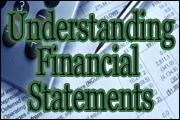Description:

|
If you're a business professional who could benefit from a more thorough grasp of financial statements, this course is tailor-made for you! You'll quickly master financial statement fundamentals and develop a comprehensive understanding of how they work, learn how to interpret them accurately, and discover how to use their information to make more effective, better-informed business decisions that have a positive impact on your organization's bottom line. Here's just a sample of what you'll learn: - How to decipher general accounting terminology and gain a clear understanding of the language of finance and accounting
- Gain insights to vastly improve your working knowledge and interpretive ability for balance sheets, income statements, and cash flow statements
- How to use your enhanced knowledge of financial statements to develop better budgeting, projection, and forecasting skills
- Interpreting annual reports: how to translate their deluge of information into knowledge that can help you make informed decisions
- How to better communicate with accountants, bankers, comptrollers, and other finance professionals
- Using financial ratios to analyze trends, conduct industry comparisons, and predict financial problems before they become insurmountable
In this powerful one-day seminar, you'll take a guided tour through the complexities of the financial statement. In clear, easy-to-understand language, we'll explain how to read financial statements, interpret their data, and put that information to positive use. This course is designed to give business owners, managers, and other non-financial professionals an arsenal of tools for understanding, analyzing, and interpreting financial statements. As a result of this course, you'll have a better understanding of not only financial statements, but of how their information fits into the "big picture" at your organization. You'll be able to use the information gleaned from financial statements to plan ahead for your organization, ensure that cash flow is regulated, and make timely, educated decisions regarding new product lines, equipment purchases, business expansion, increasing personnel, borrowing capital, and much more. AGENDA First Things First — Basic Accounting Principles for Non-Financial Professionals - How to use general accounting terminology (GAAP) like a pro
- Become familiar with the underlying assumptions accountants use when preparing financial statements: historical cost, revenue recognition, matching principles, product costs, period costs, full disclosure, conservatism, materiality, and accrual accounting
- What the FASB, SEC, and AICPA are and how they govern accounting methods
- Two primary groups who are users of financial information — who they are, what they need to know
- The difference between managerial accounting and financial accounting
The Balance Sheet - Discover what a balance sheet is, and what sets it apart from other financial statements
- Decipher how accounts are classified within the balance sheet
- "Current," "fixed," and "other" assets — what they are, how to assess their value to the company
- Use comparative analysis to analyze an organization's financial picture over a specified period of time
The Income Statement - Identify the components of a classified income statement
- Understand why tax expense on the income statement is not always the same as taxes paid during the year
- Distinguish gains and losses categorized as "extraordinary" and how they are reflected on the income statement
- Cost of Goods Sold — learn what this means to an analysis of expenses
- Learn how to determine gross profit, compare to net profit, and draw conclusions about a company's operating environment
Understanding and Analyzing Financial Statements - What financial statements can't tell you — review the limitations of financial analysis
- Using horizontal analysis to determine increases or decreases in income, profits, and expenses
- Using vertical analysis to compare individual income and expense amounts with net sales
- An introduction to ratio analysis
- Using ratios to determine profitability: proven formulas for net profit margin, net operating margin, return on assets, return on equity, earnings per share, and more!

CPE CREDIT
Fred Pryor Seminars and CareerTrack are registered with the National Association of State Boards of Accountancy (NASBA), as a sponsor of continuing professional education on the National Registry of CPE Sponsors. State boards of accountancy have final authority on the acceptance of individual courses for CPE credit. CPE certificates will be available 10 days after your event has ended. |